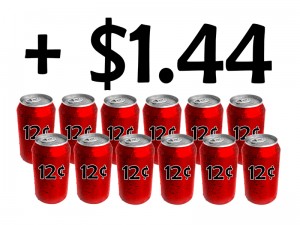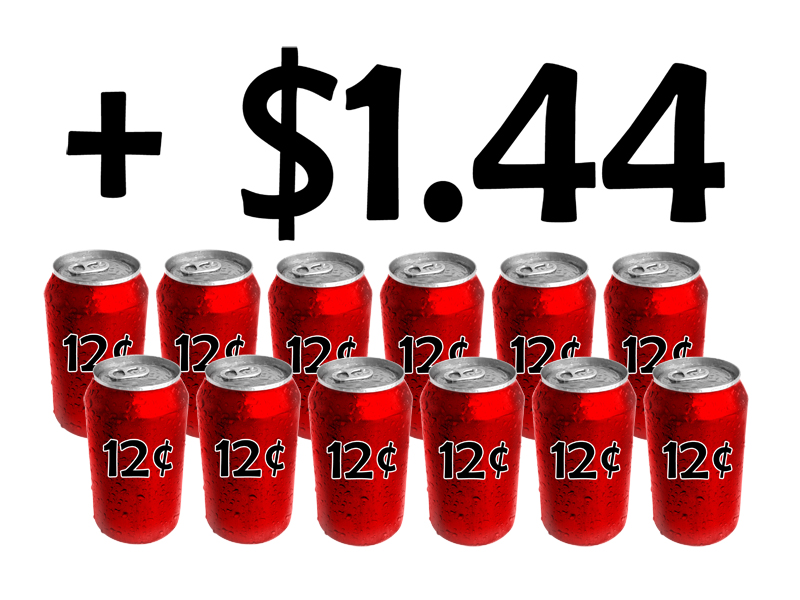
“Obesity is an epidemic” is a common phrase heard more and more frequently these days. The statement may just be an exaggeration, but the main idea is that staying healthy should always be a priority. This is probably why state Senator Bill Monning has decided to try and push forward Senate Bill 622 that will apply a tax to sugary beverages.
A person’s well-being is essential and staying fit is beneficial. However, the tax on sugary drinks is the wrong step to take. The tax, which would include soda as well as sweetened teas, seems like more of a hassle than an actual solution to the “obesity epidemic.” Charging people extra for drinks that will be consumed anyway is hardly an answer to a supposed fattening nation.
If the bill is passed, sugary drinks will incur an extra cost of one penny per ounce. That’s 12 cents per 12 ounce can, and an extra $1.44 per 12-pack, not including California Redemption Value (CRV). How are a few pennies supposed to change people’s minds about their sugar consumption? Critics are correct in believing that the increased cost will make an insignificant difference in altering people’s perspective on personal health responsibilities.
Proprietors for the proposed tax say that the extra pennies will help fund health education, improve the nutritional value of school meals and promote recreational activities. The problem with this logic is that sugary drinks have already been banned for purchase in schools throughout California. As of 2009, California schools are supposed to supply alternative beverages instead, including fruit and vegetable juices, milk, water and “electrolyte replacement beverages.” How do you improve school meals that are already required to meet health guidelines, including the omission of sugary beverages?
Schools are already required to provide fruits, vegetables and whole grains during breakfast, snack and lunch hours, and have to reduce the sodium content of student meals. Can these meals really get that much healthier? Furthermore, the ban on sugary drinks did not abjure students’ decisions to continue to enjoy said beverages.
Recreational activities and health education are swell ideas as well. But with or without the tax, sports will always be around as well as solid parental and educational figures that already have an obligation to expound their knowledge about nutritional habits to the younger generations. Greater emphasis should be placed on providing parental or educational guidance about healthy eating habits, rather than upping the price on sugary drinks.
The tax is simply an excuse to squeeze more money out of the working class. Plus, an extra few cents here and there won’t do much if people have already ignored the always-available opportunity for exercise and better food choices.
Generally speaking, the people of California are very healthy. In comparison to other states, California is only 23.8 percent obese, as reported by the Centers for Disease Control and Prevention back in 2011. No state scored below 20 percent. For a state of about 38 million people, this is impressive. The penny-per-ounce plan sounds unnecessary at this point.
Besides, if health is an issue for politicians, then why not tax alcoholic beverages more instead? According to U-T San Diego, “The rate of $1.28 per gallon is more than six times higher than taxes on wine or beer.” A higher tax on wine and beer could result in fewer alcoholics or drunk-driving accidents, but obesity is a more trending topic and this tax is merely a resourceful excuse to increase state revenue.
People should know that sugary drinks are unhealthy, and that the consumption of such can lead to many consequences like heart disease and diabetes. Yet charging consumers extra is not going to make them more aware of the fact. A warning label, similar to those on packs of cigarettes would serve a much more effective purpose.
Printing warning labels would also make the manufacturers of the unhealthy drink products suffer the additional cost to change the look of their product. The companies that make sugary drinks should be the ones allocating funds to raise obesity awareness, not the taxpayers. Moreover, it is ridiculous to implement a tax that legislators only assume will increase awareness about obesity, especially since most people won’t know or care what the extra few cents really means.
Public service announcements (PSAs) are also viable options to increase obesity awareness. Instead of paying a few extra cents for some soda cans, why not tax residents a few cents in order to fund PSAs that alert the public about the negative aspects to poor health decisions, such as imbibing sugary drinks? That would be much more effective.
Most people do not support the tax anyhow, so why push the legislation when there are other options available? Some could argue that governmental institutions are required to make paternalistic decisions in order to ensure the best possible health for our nation’s citizens. But if government is going to do so, it should make more valuable and pertinent decisions that will be noticed more than some misplaced spare change.
Sugary drinks are unhealthy, but also comforting thirst-quenchers that many people love. A minute increase in taxes on these beverages will not have much of an effect on their sales. If obesity is as severe as many believe it to be, then let’s take more drastic measures to address it.








